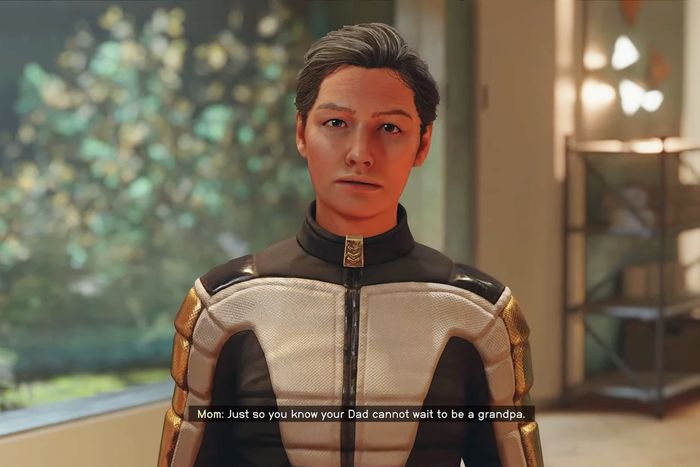
Starfield’s pitch is straightforward: IT’S SPACE, BABY. In Bethesda’s new NASA-core role-playing game, the grand possibilities of endless galactic nothingness are the point. The story necessitates that you bounce across the stars on the hunt for mystical artifacts, but the sprawling design practically begs you to wander off to sample the numerous other adventures on offer. You can navigate the political muck of opposing factions, spend hours building hopelessly elaborate ships, grind it out as a space trucker, or bop around as a pirate shouting, “Pew pew pew.”
In the hype cycle leading up to release, Bethesda frames all of this as a boundary-pushing package. Thing is, the game is a little too realistic in representing the endless possibilities of space, so much so that large swathes of the galaxy feels painfully lifeless. Worse, for all of its lofty ambitions, Starfield feels decidedly old school. At the end of the day, you’re still playing Skyrim in space. It’s a little funny, then, that the one thing that does feel genuinely revolutionary about the game is something that’s fundamentally banal: Your character can have perfectly normal parents.
This possibility emerges at the very beginning. When you’re creating a new protagonist, you’re asked to pick three character “traits,” one of the game’s foundational systems meant to ease you into the role-playing experience. Bethesda played around with these in their previous games, particularly in the Fallout franchise, and the studio returned to that character-design philosophy in Starfield. The trait system melds biographical elements with tweaks to how you interact with the world. For example, your protagonist can start out being an “extrovert” (you gain advantages when traveling with others, but disadvantages when solo) or the sort of person who owns a “dream home” (you own a pretty sick home that you can visit, but you have to pay a sizable mortgage — I thought this was a fantasy?).
Or you could be a spacefaring adventurer with parents who are very much alive, accessed through selecting the trait marked “Kid Stuff.” Amusingly, the trait is mechanically represented as a burden, in that you automatically send out 2 percent of whatever money you have every week to subsidize your parent’s luxury retirement apartment in a Vancouver-esque space megalopolis called New Atlantis. But what you get back for your troubles is a lovely bit of texture.
For one thing, you can visit your parents at any time. You’ll start being prompted to do so early in the game when a quest marker pops up nudging you to swing by and say hello, for which you’ll be doted upon by two parents who are chill, chipper, and really proud of their kid. Later, you’ll start bumping into them across the galaxy. Sometimes, it’ll be at a random tourist trap on some faraway planet … or at a seedy club in Starfield’s version of a cyberpunk city. Occasionally, when you go back to the Lodge, which serves as the hub for your adventures, your compatriots will tell you that mom and dad stopped by earlier to check on you. It’s actually really sweet.
The “Kid Stuff” trait mostly comes off as a gag on the part of the developers. But it does make me think about how rare it is for us to consider video-game protagonists’ parents as extensions of their fictional biographies — if they even have them at all. Many iconic characters seem to exist outside any biological chain. Link is just some elfin dude who popped out of nowhere. Meanwhile, it’s bizarre to think Mario and Luigi of having a mustachioed father. (Let’s just forget The Super Mario Bros. Movie ever happened, okay?)
This isn’t to say parents rarely factor in video games. Far from it. Parents come up as foundational sources of trauma all the time: They’re killed (remember that Final Fantasy 7’s Cloud had a mother?), they go missing (why else did you leave the vault in Fallout 3?), they totally turn out to be the main antagonist (above all, Metal Gear’s Big Boss is a bad dad). And of course, there has been and continues to be a growing generation of games whose narratives grapple with the turmoil of being a dad: The Last of Us, God of War, the original Telltale Walking Dead game, and so on. (Rarely a mother, by the way, a reflection of who gets to be a creative director governing a project of this scale.) Critics around the turn of the 2010s referred to this as the “daddening of games,” though to some extent precedents can be detected way before that. After all, Harry Mason was poking around Silent Hill in search of his daughter as far back as 1999. But the daddening of games grounds you in the anxieties of being a parent, extracting its effectiveness from how fraught parenthood often inherently is.
So being a parent — or parents deployed as a trauma device — in video games is a thing, sure. But the notion of rolling around an in-game universe with the ambient knowledge in the back of your head that you have a living set of parents elsewhere in that universe — that feels so novel. In Starfield as in life, you’re persistently caught up in your own quest to find your place in the universe; there’s always another task, another bucket of money to chase, another adventure to get into. And occasionally, you’re reminded you have parents somewhere out there thinking of you. I love tapping into that feeling in Starfield. It’s great to be a space baby.


